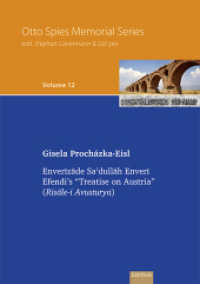Full Description
This volume is the first in-depth collection to explore the impact of language on the field of comparative constitutional law.
It addresses the epistemological and conceptual implications of English as the lingua franca. In this regard, it considers the global influence of Anglophone jurisdictions in orienting the discourse through the identification of concepts, designs and ideas that warrant engagement and exploration outside of those origin jurisdictions. In doing so, the book underscores that language is not a neutral device but can produce hegemonic pressures and expectations. It further makes the role of language in conducting comparative constitutional law explicit, so that its users can be more deliberate in their selection of foreign materials and are made conscious of the limitations of their findings due to language barriers.
The book calls for a reckoning with the rich constitutional vocabulary that non-Anglophone jurisdictions have to offer to ensure a more holistic approach to the creation of knowledge. It also emphasises the need for the contextualised study of constitutional phenomena to appreciate how these are shaped by linguistic choices. In addition to raising awareness about language's significance as an epistemological, conceptual and methodological device, the volume also puts forward constructive tools and techniques to harness language's potential, making it an indispensable resource for scholars, students, lawmakers and judges.
Contents
1. Language Matters, Erika Arban (University of Melbourne, Australia), Maartje De Visser (Singapore Management University), Jeong-In Yun (Korea University)
Part I: Language Barriers and Epistemic Imbalances
2. Causes, Consequences, and Mitigation of Language Barriers in the Global Constitutional Dialogue: Insights from Japan, Masahiko Kinoshita (Kobe University, Japan)
3. Teaching Comparative Constitutional Law in English in a Non-English-Speaking Country: The Case of Italy, Francesco Biagi (University of Bologna, Italy)
4. Blind Spots, Misunderstandings, and Enlightenment: German Experiences with English as Lingua Franca of Comparative Constitutional Law, Michael Goldhammer (EBS University, Germany)
5. (Re)Inventing Constitutional Concepts, Joel I Colon-Rios (University of Essex, UK)
6. What is in a Name? The Case of the Impossible Translation of the Concept of "Forma di Stato", Graziella Romeo (Bocconi University, Italy) and Elisa Bertolini (Bocconi University, Italy)
7. How European Integration became Constitutional: The Role of American Scholars and the Transplant of American Federal Concepts, Leonardo Pierdominici (University of Bologna, Italy)
Part II: Language Biases and Contextual Dilemmas
8. English Language Bias in Comparative Constitutional Law Scholarship, Odile Ammann (University of Lausanne, Switzerland)
9. The Uses of Ubuntu under the South African Constitution, Nomfundo Ramalekana (University of Cape Town, South Africa)
10. Linguistic Colonial Continuity, Modernity and National Integration in India, Vikram A Narayam (Humboldt University, Berlin) and Uday Vir Garg (Freie Universität Berlin, Germany)
11. Constitution-Building and Catch-Up Modernisation in Central Asia: From Semantic to Cognitive Dissonance, Aziz Ismatov (Aichi Prefectural University, Japan)
12. Towards a Cross-Linguistic Epistemology: Translanguaging as a Method of Comparative Constitutional Law, Konrad Lachmayer (Sigmund Freud University, Austria)
13. Untangling Buzzwords: Making Sense of the Vocabulary in the Anglosphere Literature of Constitutional Law, Ilker Gökhan Sen (University of Oslo, Norway)
Part III: Legal Translation, Multilingualism and the Discursive Way
14. In Defence of Multilingualism: The Contribution of Legal Linguistics and Comparative Science to the Affirmation of Multilingualism, Claudia Marchese (Suor Orsola Benincasa University, Naples, Italy)
15. The Role of English in EU's Institutional Multilingualism, CJW (Jaap) Baaij (Utrecht University, the Netherlands)
16. Comparative Law in a Multilingual Constitutional Space, And its Limits: Language and Law in the EU, Francesco Palermo (University of Verona, Italy)
17. Comparative Law, Comparative Constitutional Law and Linguistic Sensitivity, Jaakko Husa (University of Helsinki, Finland)
18. The 'Language of the Law' and the 'Sentiment of the Language': A Cultural Challenge to Enrich Global English for Comparative Legal Studies with National Identities, Giovanna Tieghi (University of Padua, Italy)
19. Bridging Borders through Translation: Corpus Linguistics and Metaphor Analysis in Comparative Constitutional Law, Lucja Biel (University of Warsaw, Poland), Hanem El-Farahaty (University of Leeds, UK), Francesca L Seracini (Catholic University of the Sacred Heart, Italy)
20. Discursive Comparative Constitutional Law, Ngoc Son Bui (University of Oxford, UK)







